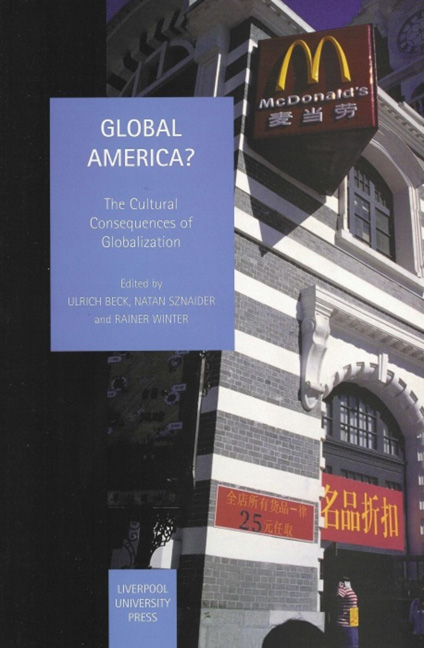Book contents
- Frontmatter
- Contents
- List of Contributors
- Acknowledgments
- Introduction
- PART I THEORETICAL PERSPECTIVES
- PART II NATIONAL CASE STUDIES
- PART III TRANSNATIONAL PROCESSES
- 8 Techno-Migrants in the Network Economy
- 9 The Americanization of Memory: The Case of the Holocaust
- 10 From the Lisbon Disaster to Oprah Winfrey: Suffering as Identity in the Era of Globalization
- 11 Global Media, Cultural Change and the Transformation of the Local: The Contribution of Cultural Studies to a Sociology of Hybrid Formations
- 12 ‘Rockization’: Diversity within Similarity in World Popular Music
- 13 The Internet: An Instrument of Americanization?
- PART IV EPILOGUE
- Rethinking Americanization
13 - The Internet: An Instrument of Americanization?
from PART III - TRANSNATIONAL PROCESSES
- Frontmatter
- Contents
- List of Contributors
- Acknowledgments
- Introduction
- PART I THEORETICAL PERSPECTIVES
- PART II NATIONAL CASE STUDIES
- PART III TRANSNATIONAL PROCESSES
- 8 Techno-Migrants in the Network Economy
- 9 The Americanization of Memory: The Case of the Holocaust
- 10 From the Lisbon Disaster to Oprah Winfrey: Suffering as Identity in the Era of Globalization
- 11 Global Media, Cultural Change and the Transformation of the Local: The Contribution of Cultural Studies to a Sociology of Hybrid Formations
- 12 ‘Rockization’: Diversity within Similarity in World Popular Music
- 13 The Internet: An Instrument of Americanization?
- PART IV EPILOGUE
- Rethinking Americanization
Summary
Once a year the Netherlands celebrates the Week of the Book. Every year an author is commissioned to write a book, usually a novelette or short story, as a gift to everyone buying books during the week. So far, for obvious reasons, the authors have been Dutch. In 2000, however, the theme for the week was ‘Writing between Cultures’, and the author invited was an avatar of intercultural writing, Salman Rushdie. The book he wrote was translated and came out under the Dutch title Woede (Fury). It is the story of a man haunted by his private version of the Greek Furies of old, cut adrift from his past, his friends, his wife and son, and ending up in self-imposed exile in New York. There, in an attempt to restore his creative powers, he invents an imaginary world, called Galileo-1, peopled by human beings and their cyborg replicas, who in a complex saga of war and ultimate victory replay the primal sagas as every culture in the world knows them. With the help of an odd assortment of computer whizzkids, the narrative is turned into a cyberspace story, accessible through a website. It becomes an instant, worldwide hit. Immediately, the characters break out of their fictional cages and begin to people the streets of the world. Messages come from all over the world about gigantic representations of the story's heroes scaling the walls of high-rise buildings. They turn up at celebrity events, sing the national anthem at baseball games, publish cookbooks and are invited to be on the David Letterman show. As the book's protagonist, Malik Solanka muses, in an ironic aside:
Everywhere in the world … people were obsessed by the theme of ‘success in America.’ In India people took exaggerated pride in the achievements of fellow-Indians, living in the US, in areas such as music, the publishing world … Silicon Valley and Hollywood. The British hysteria was, if anything, even greater. British journalist finds job in the US! Unbelievable! British actor plays supporting role in American movie! Wow, what a superstar! British comedian in drag wins two Emmy's! Fantastic, we always knew that British travesty was the best! Success in America was the only true sign of a person's mettle. (Rushdie 2001: 220; my translation)
- Type
- Chapter
- Information
- Global America?The Cultural Consequences of Globalization, pp. 235 - 254Publisher: Liverpool University PressPrint publication year: 2003



